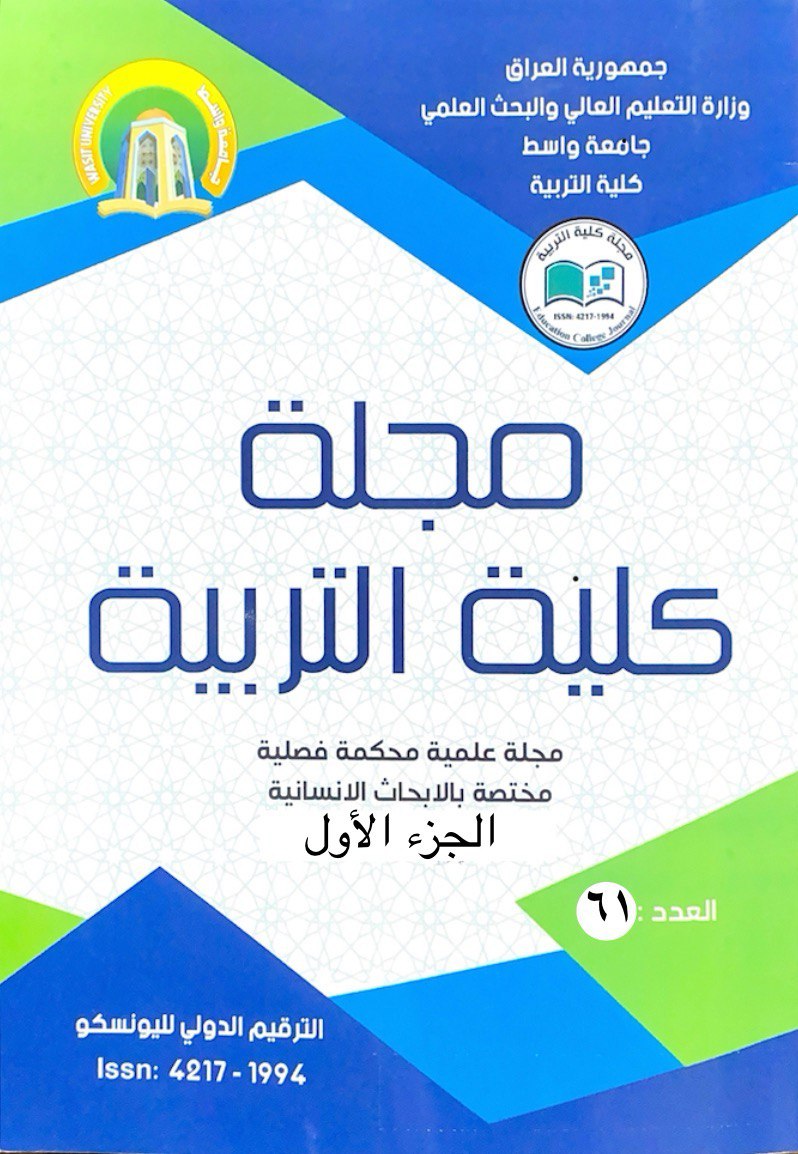Semantic thought and its role in directing meaning in grave words in Islamic thought
DOI:
https://doi.org/10.31185/eduj.Vol61.Iss1.4510Keywords:
semantic thought, grave words, Islamic thoughtAbstract
This research deals with semantics and its role in directing meaning in Islamic thought، through tracing the words of the grave that were mentioned in the Holy Quran، and tracing their meaning and connotation and semantic thought in them and the difference between the situational meaning and the usage meaning and the reason for using each word over the other and researching these reasons that God Almighty placed in each verse، so the verses came in using the words of the grave in (the graves، bury him، his grave، the isthmus) The meaning of each of these words in the dictionary، then its technical meaning، then the reason for its use in each verse، that is، the places that led to its use and distinguishing each word from the others. This was mentioned by linguists and commentators regarding the meaning of each word of the grave and the reason for its use، and this is what prompted us to clarify the multiplicity of words for one meaning or one term in the Holy Quran in general، and for the words of the grave in particular.
Downloads
References
1- القرآن الكريم
2- إبراهيم، أنيس، دلالة الألفاظ، مكتبة الأنجلو المصرية، مصر، ط5، مصر 1986.
3- ابن عطية، المحرر الوجيز، دار الفكر، بيروت، ط1، 1999.
4- ابن فارس، الصاحبي في فقه اللغة، منشورات محمد علي بيضون، ط1، 1998.
5- ابن منظور، لسان العرب، دار صادر بيروت، ط1، 1993
6- أبو حيان، البحر المحيط، تحقيق : محمد العبيدي و أمين عبد الوهاب، دار صادر ، بيروت، ط1، 1998.
7- الأبيض، أشواق حسن علي، الوحدة الموضوعية في القرآن الكريم، دار الفكر، بيروت، ط1، 1999..
8- البغوي، معالم التنزيل، دار التراث، بيروت، ط1، 2007.
9- التهانوي، كشف اصطلاحات الفنون، ، دار التراث العربي، بيروت، لبنان، ط1، 2008،
10- الجرجاني، التعريفات، دار المعرفة، بيروت، ط1، 2007.
11- الخالدي، صلاح، مفاتيح التعامل مع القرآن الكريم، دار القلم، دمشق، ط2، 1992.
12- الخليفة، حسين، علم المفردة القرآنية، مركز عين، ط1، 2018.
13- الراغب الأصفهاني، المفردات في غريب القرآن، تحقيق: محمد سيد كيلاني، دار المعرفة، بيروت، د.ط.
14- الزمخشري، أساس البلاغة ، مؤسسة الرسالة، بيروت، ط1، 2008،.
15- السامرائي، إبراهيم، العربية تواجه العصر، دار الأمل، العراق، ط3، 1997.
16- السامرائي، فاضل، مراعاة المقام في التعبير القرآني، ،دار الفكر، بيروت، ط1، 1999.
17- الطباطبائي، تفسير الميزان، دار الفكر، بيروت، ط2، 1999.
18- عبد الغفار، سيد، التصور اللغوي، دار المعرفة، مصر، ط1، 1999. DOI: https://doi.org/10.21608/mkdaf.1999.152882
19- عبد المجيد، ناظم، مباحث في التفسير الموضوعي ، ناظم عبد المجيد، دار الفكر، بيروت، ط2، 1999،
20- الفيروز أبادي، القاموس المحيط، تحقيق: أنس الشامي، زكريا أحمد، دار الحديث، القاهرة، ط1، 2008.
21- القرطبي، الجامع لأحكام القرآن، تحقيق إبراهيم اطفيش، دار الفكر، بيروت، ط1، 1997.
22- الكفوي، الكليات، دار الفكر، بيروت، ط1، 1999،
23- منقور، عبد الجليل، علم الدلالة، أصوله ومباحثه في التراث العربي، اتحاد الكتاب العرب، دمشق، 2001.
24- موسوعة لالاند الفلسفية، مؤسسة العلم للترجمة، بيروت، ط1، 1998،
Downloads
Published
Issue
Section
License
Copyright (c) 2025 م.م احمد هاشم جواد

This work is licensed under a Creative Commons Attribution 4.0 International License.









